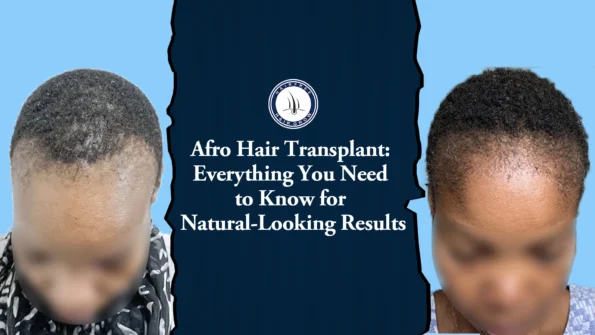People of African descent have so many amazing hairstyles to choose from because of the unique texture of their hair. Afro hair is naturally curly, which makes it different from straight hair types, like Asian or Caucasian hair. While curly hair can be beautiful, it can also make things like hair transplants a bit more complicated. If you’re considering an Afro hair transplant, you’re probably wondering how the process works and if it’s the right choice for you. Don’t worry, we’re here to help guide you through everything you need to know in a simple and easy-to-understand way.
What is Afro Hair Transplant?
An Afro hair transplant involves the process of extracting hair follicles from one part of the scalp and implanting them in areas affected by hair loss. Due to the unique characteristics of Afro hair, the procedure requires special attention to detail. Afro hair is known for its dense curls, which can be more challenging to manage during a transplant.
Hair Density and Appearance
Afro hair typically has less density compared to Asian or Caucasian hair, but its natural curl gives it a fuller appearance. This means fewer grafts are needed to create a voluminous look.
Curl Under the Skin
One of the main differences between Afro hair and straight hair is that Afro hair curls beneath the skin as well. This subcutaneous curl means that the follicles take up more space under the skin, which can make the transplant procedure more complex.
FUE Challenges
Follicular Unit Extraction (FUE) can be difficult or even impossible for Afro hair, as the curliness of the hair makes it harder to extract and implant the follicles. However, a small test session may be conducted to assess whether FUE is suitable, or in some cases, the FUT (Follicular Unit Transplant) method may be recommended.
Skin Characteristics
Afro skin tends to be thicker and tougher, requiring specialized techniques to ensure successful hair implantation. Additionally, African-American individuals may be prone to keloid scarring after certain procedures, though this is rare with FUE.
Hair Type Variation
Afro hair varies from individual to individual, even within the African population. For example, Somalians often have looser curls compared to Nigerians. This means the transplant technique may vary based on the specific type of curl.
Difference Between Afro Hair and Straight Hair
Feature | Afro Hair | Straight Hair |
Structure | Curly roots, coiled strands | Uniform, smooth strands |
Transplantation Complexity | More complex due to curl pattern; requires careful handling | Easier due to straight follicle growth |
Risk of Damage | Higher risk of follicle damage during extraction | Lower risk due to simpler structure |
Density Appearance | Appears denser due to curls covering more area | Less dense appearance per square inch |
Styling Versatility | Wide range: afro cuts, braids, twists, waves | Limited to straight, wavy, or slightly curled styles |
Maintenance | Requires more hydration and specialized care | Generally lower maintenance |
Do Hair Transplants Work for Afro Hair?
Yes, hair transplants work for Afro hair, including those of Afro-American and Afro-Caribbean individuals. However, the procedure can be more complex due to the curliness and density of the hair.
- Surgeon Expertise: It is essential to choose a surgeon who is experienced in working with Afro hair. This ensures that the transplant is done properly and reduces the risk of complications.
- Afro Hair Transplant Cost: The cost of an Afro hair transplant can vary depending on the location, surgeon’s expertise, and the complexity of the procedure. On average, the cost is higher compared to straight hair transplants due to the additional skills required.
- Afro Hair Transplant Before and After: Patients can expect visible results in 10-12 months after the procedure. Afro hair transplant before and after photos can be found at most clinics, offering an insight into the potential success of the procedure.
- African American Hair Transplant Success Rate: The African American hair transplant success rate is typically high when performed by a skilled surgeon. Factors such as the patient’s overall health, the type of hair loss, and the post-transplant care all contribute to the success of the procedure.
Afro Hair Transplant for Men
Hair loss in Black men is often caused by androgenic alopecia, which is a genetic condition. However, aging, stress, illness, and certain medications can also lead to hair loss. For men, the primary areas affected by hair loss are the frontal and vertex regions of the scalp.
- Causes of Hair Loss: Androgenic alopecia is the leading cause, but stress, medications, and illness can also contribute.
- Hair Transplant Solutions: Clinics like Cosmedica in Turkey offer specialized services for Afro-American men. These procedures are both affordable and successful, offering customized treatments based on individual needs.
Afro Hair Transplant for Women
Hair loss in African women can occur due to androgenic alopecia as well as traction alopecia, which is caused by tight hairstyles like braids, cornrows, and twists. These styles can lead to hairline thinning, making a hair transplant a suitable solution.
- Procedure Details: The transplant procedure may require shaving the affected area for easier implantation. It’s important to work with a clinic that has experience with Afro hair types.
- Expertise in Turkey: Many specialized clinics in Turkey offer excellent care for Afro hair transplants, providing tailored solutions to restore lost hair.
- Hair Growth Timeline: Due to the slower growth rate of Afro hair, results may take 10-12 months to fully show. Patients should be patient, as visible results typically start after this period.
Challenges for African-American Hair Transplantation
- Curly Hair Structure: Afro hair grows in a spiral pattern, making it harder to extract and implant without damaging surrounding follicles.
- Thicker Skin: African-American skin tends to be thicker and tougher, making the transplant process more complex and requiring extra care.
- Risk of Keloid Scarring: Some African-Americans are more prone to keloids (raised scars), particularly with the FUT method.
- Precision Required: Surgeons need to be highly skilled to handle the unique challenges of Afro hair and skin during the procedure.
Benefits of African-American Hair for Transplantation
- Fuller Appearance: The natural curl of Afro hair provides volume, even with lower hair density, reducing the number of grafts needed.
- Thicker and Stronger Hair: Once transplanted, Afro hair tends to grow thicker and stronger, helping maintain long-lasting results.
- Versatile Styling: Afro hair allows for a wide variety of unique hairstyles like braids, twists, and afro cuts, which are difficult to achieve with straight hair.
Which Technique is Best for Afro Hair?
The best hair transplant techniques for Afro hair are FUE (Follicular Unit Extraction) and DHI (Direct Hair Implantation). These methods are most effective for Afro hair due to their precision and ability to minimize damage to the hair follicles.
FUE Method
- Involves extracting individual hair follicles and implanting them into the target area.
- FUE is a time-consuming process, but it produces better results than older methods like FUT (strip).
- There are four variations of FUE:
- Manual FUE
- Handheld Motorized FUE
- Robotic FUE
- Automatic FUE
- The technique used depends on the surgeon’s expertise and the patient’s hair loss diagnosis.
DHI Method
- Uses a Choi pen to extract and implant hair follicles, which helps minimize graft damage.
- The procedure may take up to two days depending on the number of grafts needed, making it more time-consuming than FUE.
Why Should You Choose HairFree HairGrow Clinic for Your Afro Hair Transplant?
HairFree HairGrow Clinic is known for its expertise in Afro hair transplants, providing excellent care and results. The clinic’s specialists have vast experience with Afro hair and are trained in advanced techniques like FUE hair transplant for Afro hair and DHI.
Benefits of Choosing HairFree HairGrow
- Skilled surgeons with experience in Afro hair transplant.
- Use of state-of-the-art technology to ensure successful transplants.
- Affordable Afro hair transplant cost compared to other clinics.
- Personalized care and post-transplant support to ensure the best results.
Post-Transplant Care for African-American Hair
Proper post-transplant care is essential for the success of your procedure. Here are some key care tips:
- Moisturize: Use hydrating shampoos and conditioners to keep Afro hair moisturized.
- Avoid Heat Styling: Limit the use of heat tools like flat irons and curling irons to prevent damage.
- Protective Styles: Consider protective styles like braids or twists to minimize hair manipulation.
- Scalp Care: Massage natural oils like jojoba or coconut oil to improve circulation and promote hair growth.
- Regular Follow-ups: Stay in touch with your clinic for regular check-ups and to address any concerns.
Conclusion
An Afro hair transplant can restore confidence and provide a fuller, natural look for those dealing with hair loss. While the procedure requires special expertise due to the unique characteristics of Afro hair, choosing the right clinic with experienced surgeons can lead to excellent results.
If you’re considering a hair transplant, make sure to research the best hair transplant clinics for African American hair, understand the Afro hair transplant cost, and review Afro hair transplant before and after photos to see potential results. Remember, a successful transplant depends on factors like surgeon expertise, technique used, and post-transplant care.
If you’re ready to take the next step, contact HairFree HairGrow Clinic for a consultation and personalized treatment plan tailored to your unique hair needs.
Written By
MBBS, MD
Dr. Pratibha Pradhan is a leading expert in Afro Hair Transplant, specializing in advanced techniques for natural, long-lasting results. With years of experience in hair restoration, she understands the unique structure of Afro-textured hair, ensuring precise, tailored treatments for optimal hair growth and patient satisfaction.
Disclaimer
We’ve made all possible efforts to ensure that the information provided here is accurate, up-to-date and complete, however, it should not be treated as a substitute for professional medical advice, diagnosis or treatment. See Detailed Disclaimers Here.



